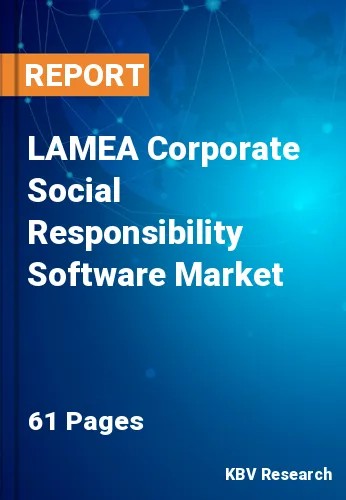The Latin America, Middle East and Africa Corporate Social Responsibility Software Market would witness market growth of 14.1% CAGR during the forecast period (2022-2028).
Philanthropic responsibility questions how a business behaves and how it contributes to society. In its most basic definition, philanthropic duty is how an organization allocates resources to improve. For instance, if a business distributes its profits to good causes or charities or with suppliers or vendors that share its charitable values.
If an employer provides time off or matches employee donations regarding charitable efforts or a business participates in community fundraising activities or supports them. Financial responsibility is the pillar of corporate social responsibility that unites the three aforementioned categories. A firm may want to become more environmentally friendly, morally upright, and charitable, but it must support these objectives with cash contributions to programs, charitable donations, or product development.
The following expenses are included in this: Research and development for novel goods that promote sustainability. Securing a diverse staff by hiring a range of talent. initiatives that educate staff members about DEI, social responsibility, or environmental issues. Procedures that could be costlier yet offer higher CSR outcomes. Making sure financial reporting is accurate and timely, including external audits.
The subject of CSR has recently taken on significant importance in The Kingdom of Saudi Arabia, just as it has on an international scale. Major governmental, semi-private, and non-governmental groups are attempting to raise awareness of these phenomena in this nation. Moreover, several businesses increasingly prioritize maintaining and expanding their shares by becoming the greatest societal contributors. As a result, the notion of CSR in the Kingdom has seen substantial development throughout the last five years, with the previous two years visiting the most growth. The appreciation of businesses engaging in CSR with rising awareness towards it is expected to increase the utilization of CSR software which will drive the market growth in the LAMEA region.
The Brazil market dominated the LAMEA Corporate Social Responsibility Software Market by Country in 2021, and would continue to be a dominant market till 2028; thereby, achieving a market value of $28.9 Million by 2028. The Argentina market is experiencing a CAGR of 14.7% during (2022 - 2028). Additionally, The UAE market would display a CAGR of 13.8% during (2022 - 2028).
Based on Deployment, the market is segmented into Cloud and On-premise. Based on Application, the market is segmented into Large Enterprises and Small & Medium-Sized Enterprises (SMEs). Based on countries, the market is segmented into Brazil, Argentina, UAE, Saudi Arabia, South Africa, Nigeria, and Rest of LAMEA.
Free Valuable Insights: The Worldwide Corporate Social Responsibility Software Market is Projected to reach USD 1.4 Billion by 2028, at a CAGR of 9.7%
The market research report covers the analysis of key stake holders of the market. Key companies profiled in the report include Wolters Kluwer N.V., NAVEX, Inc., Salesforce.com, Inc., Benevity, Inc., GivePulse, Inc., CyberSWIFT Infotech Pvt. Ltd., iPoint-systems gmbh, Blackbaud, Inc. (YourCause, LLC), Tennaxia and Vee Technologies (The Sona Group).
By Deployment
By Application
By Country
Our team of dedicated experts can provide you with attractive expansion opportunities for your business.

